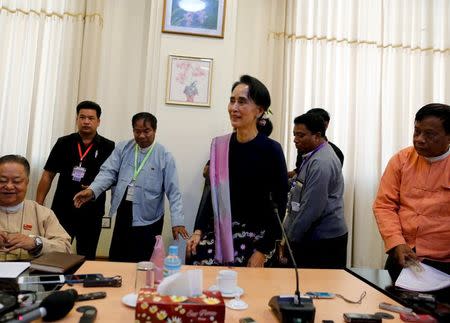Suu Kyi meets Myanmar's military chief again as transition talks drag on

YANGON (Reuters) - Aung San Suu Kyi met again with Myanmar's powerful commander-in-chief on Wednesday, according to a Facebook post by his office, as talks over a protracted political transition drag on and amid reports that the military chief has secured a five-year extension. The meeting is the third between Senior General Min Aung Hlaing and Suu Kyi since her National League for Democracy (NLD) won a sweeping victory at the Nov. 8 general election, securing some 80 percent of elected seats in parliament. The post on the page of the commander-in-chief's office said that discussions in Naypyitaw, the capital, lasted just over an hour and focused on "the rule of law and achieving everlasting peace." Top aides from the NLD and military were both present. The meetings between Suu Kyi and Min Aung Hlaing, the last of which took place in late January, have been closely watched by the Myanmar public, but neither side has divulged the content of the talks. One topic being discussed between the NLD and the military, according to two people briefed on previous talks, is the appointment of chief ministers in Rakhine, Shan and Kachin states and Yangon. The Wall Street Journal and local newspaper The Voice, have both reported that Min Aung Hlaing has had his term extended for another five years, which would keep him in the top post through the new government's administration. The military stepped back from direct rule of Myanmar in 2011 after nearly five decades in power. Under the semi-civilian government that took its place, the military still holds considerable political power and Suu Kyi will need to forge a relationship with the armed forces to govern effectively. A quarter of the seats in the country's national level parliament are held by unelected military MPs. The same is true for the smaller state and regional parliaments. The military also remains in control of three key ministries -- defense, border affairs and home affairs. Myanmar's transition is particularly lengthy. The country's NLD dominated parliament sat for the first time on Feb. 1, but the nominations for president will not be announced until March 17. Under the military drafted constitution, Suu Kyi is barred from becoming president because her sons are not Myanmar citizens. The military, which sees itself as the protector of the constitution and holds an effective veto power over changes to the document, has said that there are no plans to change the clause barring Suu Kyi. (Reporting by Timothy Mclaughlin and Swan Pyae Win Naing; Editing by Simon Cameron-Moore)

